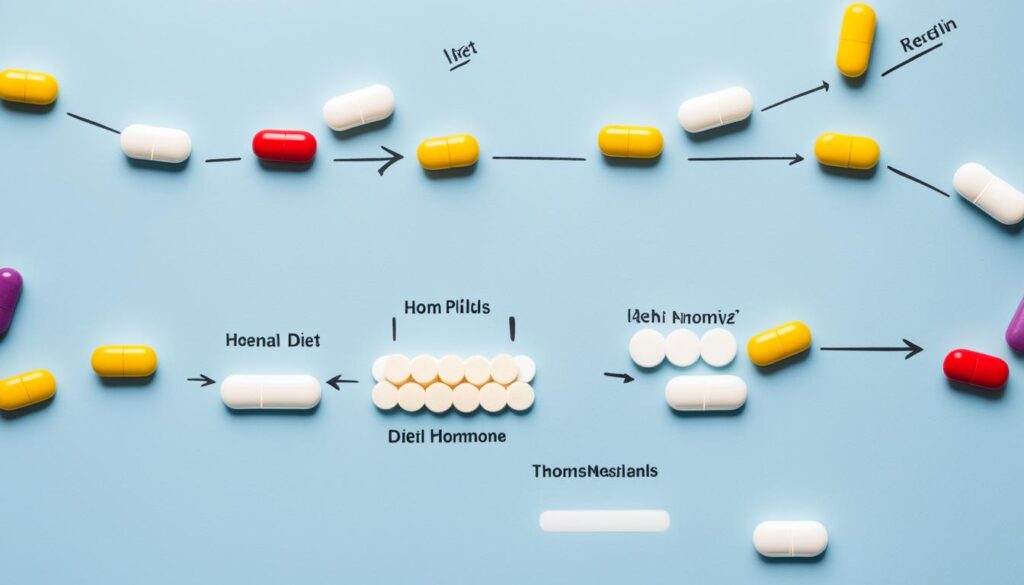Diet pills are medications or supplements to aid in weight loss. They haven’t always been safe, though. The FDA has banned or removed some in the past due to risks. But now, these drugs go through tough testing. This is to make sure they help without causing harm.1
Key Takeaways : Diet pills
- Prescription weight-loss drugs can lead to a total body weight loss of 3% to 12% more than achieved through lifestyle changes alone when used for a year.1
- Six weight-loss drugs have been approved by the FDA for long-term use, including Bupropion-naltrexone (Contrave), Liraglutide (Saxenda), Orlistat (Xenical, Alli), Phentermine-topiramate (Qsymia), Semaglutide (Wegovy), and Setmelanotide (Imcivree).1
- The combination of weight-loss medicine with lifestyle changes results in greater weight loss than lifestyle changes alone.1
- Prescription weight-loss drugs may not be covered by insurance and can be expensive.1
- Prescription weight-loss drugs should be used in conjunction with a healthy diet and regular exercise, not as a standalone solution for weight loss.1
Understanding Diet Pills
Diet pills, or weight loss pills, are made to help people shed weight.1 They add to changes in diet and activity to fight obesity and its threats.
Definition and Purpose
These pills aim to cut your appetite, block fat uptake, or balance weight-related hormones.1 They fit into a complete plan with eating right and staying active.
History and Evolution
The story of diet pills began many years ago. At first, some got criticized for safety and were removed or banned.2 But the FDA now checks them more thoroughly, so many are safe for long-term weight control.1
Old pills cut 4% to 5% off body weight3, but new types can slim 10% to 15%. Tirzepatide, for example, might even do 20%.3 Yet, the older pills could cause more harm than the modern ones.3
The market for such supplements now reaches $2 billion dollars.3 But, many you can buy without a prescription escape FDA rules and may not be as helpful or secure.2
Though pills have improved over the years, think twice. Safe use is tricky. For the best advice, always talk with a doctor.
FDA Regulations and Approval Process
![]()
The FDA, or Food and Drug Administration, is key in making sure diet pills are safe and work well. This includes both those you need a doctor to prescribe and those you can buy without a prescription.4 In 1994, the Dietary Supplement Health and Education Act (DSHEA) set the rules and gave the FDA power over these pills.4 The FDA doesn’t check supplements before they go on the market, but they do keep an eye on their safety and how true their labels are.4
Safety Concerns and Oversight
It’s up to the companies that make diet supplements to make sure their products are safe and follow the law.4 The labels must show what’s in them, like how much of each vitamin or herb.4 If a product says it can help with health issues, it’s seen as a drug. That means it must meet stricter rules.4 The FDA visits supplement-making places and checks their products often.4 They watch out for any misleading health claims on the labels.4 They also keep an eye on reports of any health issues from people using supplements. If a product seems risky, the FDA can ask for it to be taken off the market.4 Remember, always talk to your doctor before you start using new supplements.4 Be sure to use them as directed, not as a replacement for medicine, and watch out for false promises.4 If you think a supplement made you sick, it’s very important to tell the FDA about it.4
Rigorous Testing and Review
5 The DSHEA law calls a product a dietary supplement if you take it by mouth and it has “dietary ingredients.” This could be vitamins, herbs, amino acids, and more to add to your diet.5 The FDA doesn’t vet these supplements before they’re sold under DSHEA. But, if a supplement uses a new ingredient since October 1994, the company must let the FDA know 75 days before they sell it across states.5 To be safe, companies must make supplements using good methods. This means the product must be what it says it is, safe, and right.5 If a product’s label promises good health, the company has to be able to prove it honestly.5 The label also must clearly say what the supplement is, who made it, what’s in it, and how much you get.5 Any and all ingredients not in the main list must be shown in another ingredients list. This is to give you the full picture of what’s in the supplement.5 How much of a supplement you should take, and how much of each thing it has, is up to the company.5
How Do Diet Pills Work?

Diet pills help with weight loss in several ways. They can reduce your appetite, block fat absorption, and affect certain hormones.1
Appetite Suppression
Pills like phentermine or liraglutide reduce hunger by affecting brain chemicals. This makes people feel full longer and eat less.1
Fat Absorption Reduction
Orlistat (Xenical, Alli) stops the body from absorbing some fats. This lets fat leave the body without being used. You might lose a little weight but could have stomach issues.16
Hormonal Regulation
Drugs such as semaglutide (Wegovy) and tirzepatide (Zepbound) affect hormones related to eating and burning calories. They act like hormones that help control blood sugar, lessen hunger, and increase the feeling of being full.1
Diet pills can be a useful addition to making life changes for losing weight. But, always talk to a doctor and follow the directions for safe and right use.16
Effectiveness of Diet Pills

Diet pills have changed a lot over the years. Today’s pills show better results. Prescription pills, in particular, are turning heads.1 They can help you lose more weight in a year than just changing your lifestyle. This is really good news.1 If you manage to lose 5% to 10% of your weight and keep it off, your health gets a big boost.1 Your blood pressure, blood sugar, and triglyceride levels could all drop.
Average Weight Loss Potential
These medications can cut 5% to 10% of your body weight off. The exact amount varies. GLP-1 agonists are one example, like liraglutide and semaglutide.7 They’ve been shown to help people lose a lot of weight. Some lost up to 15% over certain periods. Orlistat is also effective.7 In a study, it helped people drop 10.3 lb in six months. Phentermine/topiramate did even better. It led to 17 lb of weight loss on average. Some people managed to lose up to 19.4 lb.7
Long-term vs. Short-term Use
The latest diet pills offer great short-term benefits. But, we need more data on their long-term effects.7 A large study showed that only 4% of 2,800 participants relied on these pills for their success.6 Only two drugs are actually FDA-approved for longer use. They’re meant for those dealing with serious obesity.6 So, while these pills can be part of your plan, they’re not a magic fix. They work best alongside healthier habits.1
Types of Diet Pills

Diet pills fall into two main types: prescription medications and over-the-counter supplements. You need a doctor’s prescription for FDA-regulated prescription weight-loss drugs. Over-the-counter supplements, on the other hand, can be bought without a doctor’s note.1
Prescription Medications
Among FDA-approved prescription weight-loss drugs for long-term use are Bupropion-naltrexone, Liraglutide (Saxenda, Victoza), Orlistat (Alli, Xenical), and others.1 These diet pills can help shed significant weight. They might boost weight loss by 3% to 12% more over a year when compared to just making lifestyle changes.1
GLP-1 agonists, such as Wegovy and Ozempic, mimic GLP-1. They regulate blood sugar, curb appetite, and increase feelings of fullness.8 In studies, the top dose of Wegovy helped people lose over 12% of their body weight in 17 months on average.8
Over-the-Counter Supplements
Besides prescription diet pills, there are over-the-counter weight-loss supplements like Orlistat (Alli, Xenical) and Contrave. You can buy these without a doctor’s referral. However, their effectiveness and safety may vary from prescription drugs.9
New players, like Zepbound for adults with a BMI of 30 or more, have joined the game. This shows the market is changing, taking into account cost and side effects. Additionally, drugs like semaglutide, liraglutide, and orlistat are now okay for kids 12 and older.9
With ongoing developments, a wider range of prescription weight-loss drugs and over-the-counter supplements is available. This means more options for tailored treatment plans that fit each person’s specific needs and choices.9
Potential Side Effects

The latest diet pills are safer than before, but they still have risks. Common side effects include nausea, diarrhea, constipation, and stomach pain.1011
Common Side Effects
Nausea happens to about 44% of those using semaglutide,10 and diarrhea affects 30%. Vomiting hits about 24% of users.10 Also, 24% may experience constipation, and 20% could feel stomach pain.10 Only 7% might feel bloated, and 5% can get heartburn from the drug.10
Serious Side Effects
But, weight loss drugs carry even bigger risks. GLP-1 agonists could raise pancreatitis, bowel obstruction, and gastroparesis chances.10 A new drug, tirzepatide, might lead to thyroid problems or cancer.10 Discuss these issues with a doctor if you’re looking into diet pills. It’s important to know the good and bad.10
Yes, modern weight loss medications are much safer overall. But, being informed about side effects is still key. This helps you choose what’s best for your health.1011
Who Should Consider Diet Pills?

Diet pills might be helpful for those fighting obesity and its health effects. But, not everyone should use them. It’s best to talk with a doctor first. They will check if you need these pills based on your weight and health issues.
BMI and Obesity Criteria
The FDA says that if your BMI is 30 or more, you are obese.8 Some people with a BMI of 27 or more and health problems like diabetes or heart conditions might be able to use these drugs.8
Weight-Related Health Conditions
If you have health issues because of your weight, these drugs can help.1 Conditions like type 2 diabetes, high blood pressure, and heart disease could get better.1 Losing weight with these pills can improve or even fix these problems.1
Discuss taking diet pills with your doctor before starting.1 They will look at your health history and decide if this is a good option for you. Using these drugs for a long time needs careful watching. Your treatment might change as needed.1
Diet Pills and Lifestyle Changes

Diet pills can help with weight loss, but it’s crucial to also focus on living healthy. This means improving diet and exercise.1 Using weight-loss drugs long-term can help shed more weight, from 3% to 12%, than just changing your habits in a year.1 But, combining these drugs with a healthy lifestyle boosts the weight loss even more.1
Importance of Diet and Exercise
1 Dropping 5% to 10% of your total weight and sticking to it is good for your health. It can lower your blood pressure, blood sugar, and triglycerides.12 Losing more than 10% is also great, especially for people with type 2 diabetes and heart problems.13
Weight loss pills are part of the plan but aren’t the whole solution. You must be ready for long-term lifestyle changes.
Long-term Weight Management
In one study, patients kept off 10.7% of their weight for about 5 years. A third even maintained a 15% weight loss.12 Right use of weight loss drugs can steer you toward your goals safely. Some may need to keep using them to keep the weight off.12 Drugs like metformin, topiramate, and phentermine are proven to work. But, stopping them could mean gaining the weight back.13 Sticking with healthy habits way beyond the weight loss phase is key.
Also Read: Understanding Diet Definition: Health Essentials
Conclusion
In summary, diet pills can help those fighting obesity and its related health issues. Yet, they must be used carefully, part of a wider weight management plan. The latest weight-loss medications are safer and more effective, which is good news. However, it’s essential to know they’re not a magic solution. Making important lifestyle changes is key for keeping off weight over time.14
We see that over two-thirds of U.S. adults and nearly one-third of kids and teens are overweight or obese. A large number attempt to shed pounds with diet pills and supplements. Yet, the FDA keeps a close eye on these products. They make sure they’re safe and work well, by setting strict guidelines for claims and ingredients.14
At the end of the day, diet pills can give a helpful push in losing weight. But they work best when teamed up with a well-rounded diet and regular exercise. This two-pronged strategy is vital for long-lasting weight management and better health.1516
FAQs
Q: What are weight loss medications?
A: Weight loss medications, also known as weight loss drugs, are prescription or over-the-counter medications designed to help people lose weight by promoting weight loss or suppressing appetite.
Q: How do weight loss medications work?
A: Weight loss medications work in different ways, such as by suppressing appetite, regulating body fat, or causing weight loss through various mechanisms.
Q: Are weight loss medications FDA-approved?
A: Yes, many weight loss medications are FDA-approved for the treatment of obesity or to help treat type 2 diabetes in addition to promoting weight loss.
Q: What are some common weight loss medications?
A: Some common weight loss medications include phentermine, Orlistat (Xenical), Ozempic (Semaglutide), Saxenda (Liraglutide), Contrave, Qsymia, and others.
Q: Do weight loss medications work for everyone?
A: Weight loss medications may not work for everyone, and their effectiveness can vary depending on individual factors. It’s important to consult with a doctor before starting any weight loss medication.
Q: Are weight loss medications regulated by the FDA?
A: Yes, weight loss medications are regulated by the FDA to ensure their safety and efficacy for use in treating obesity and related conditions.
Q: What should I know before taking weight loss medications?
A: Before taking weight loss medications, it’s important to consult with your doctor to discuss potential side effects, proper dosage, and whether the medication is suitable for your weight loss journey.
Q: What are some side effects of weight loss medications?
A: Common side effects of weight loss medications may include changes in heart rate, gastrointestinal issues, or interactions with other medications. It’s important to be aware of the potential risks before starting any weight loss medication.
Source Links
- https://www.mayoclinic.org/healthy-lifestyle/weight-loss/in-depth/weight-loss-drugs/art-20044832
- https://www.healthline.com/health/healthy-eating/diet-pills
- https://www.houstonmethodist.org/blog/articles/2023/feb/do-weight-loss-pills-work-5-more-questions-answered/
- https://www.fda.gov/consumers/consumer-updates/fda-101-dietary-supplements
- https://www.fda.gov/food/information-consumers-using-dietary-supplements/questions-and-answers-dietary-supplements
- https://health.ucdavis.edu/news/health-wellness/can-diet-pills-help-you-lose-weight/2010/07
- https://www.healthline.com/nutrition/weight-loss-medication
- https://www.webmd.com/obesity/weight-loss-prescription-weight-loss-medicine
- https://obesitymedicine.org/blog/weight-loss-medications/
- https://obesitymedicine.org/blog/5-common-weight-loss-medications-their-side-effects-obesity-medicine-association/
- https://www.drugs.com/article/side-effects-weight-loss-drugs.html
- https://www.healthline.com/health-news/to-lose-weight-and-keep-it-off-study-finds-lifestyle-changes-and-medications-can-be-crucical
- https://www.hackensackmeridianhealth.org/en/healthu/2024/04/30/weight-loss-pills-do-they-actually-work
- https://ods.od.nih.gov/factsheets/WeightLoss-HealthProfessional/
- https://www.webmd.com/obesity/features/weight-loss-medication
- https://www.eatingwell.com/article/8035953/diet-pills-and-weight-loss-medication/








Leave A Comment